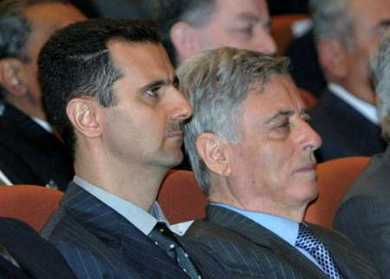 (AFP), 31 december 2005, DAMASCUS – Syrian lawmakers called on Saturday for former vice president Abdel Halim Khaddam to face treason charges after his dramatic revelations that President Bashar Al Assad threatened former Lebanese premier Rafiq Hariri just months before his murder.
(AFP), 31 december 2005, DAMASCUS – Syrian lawmakers called on Saturday for former vice president Abdel Halim Khaddam to face treason charges after his dramatic revelations that President Bashar Al Assad threatened former Lebanese premier Rafiq Hariri just months before his murder.
“We must await the results of the investigation, but no Syrian security service could take such a decision unilaterally,” Khaddam said.
“Khaddam unveils the secrets of Hariri’s assassination,” Lebanon’s top-selling liberal newspaper An-Nahar wrote. “Will he be the key witness in the UN probe?”
“The battle of Damascus, the battle of the regime has begun,” predicted a Lebanese MP from the anti-Syrian majority who asked not to be named.
A Syrian analyst who requested anonymity questioned the timing of Khaddam’s declaration, “which comes as pressure on Syria has begun to diminish and as a new chief was named to head” the UN probe.
The pro-Damascus paper Ad-Diyar charged: “Syria’s Judas has pocketed 30 million dollars, firing off accusations and becoming … an informer for (outgoing UN probe chief) Detlev Mehlis.”
Syrian MP George Jabbur described Khaddam’s charges as “delicate and dangerous” and added in an interview with Al-Arabiya that ”Khaddam must not forget he was a part of the government. He played an important role in the country’s foreign policy.”
Khaddam said he had advised Hariri to leave Lebanon “because his situation regarding Syria had become complicated” in the wake of the threat.
“But, of course, at no time did it occur to me that Syria could assassinate Hariri,” Khaddam said.
Khaddam also pointed a finger of blame for tensions in Lebanon before the Hariri murder at Rustom Ghazaleh, Syria’s military intelligence chief in Lebanon before its troop withdrawal.
“Rustom Ghazaleh behaved as if he had absolute power” in Lebanon, said the former vice president.
In the Al-Arabiya interview, Khaddam, 73, also announced the reasons for his resignation at a Baath party congress in June and his break with the regime.
He said he was “convinced that the process of development and reforms, be they political, economic or administrative, will not succeed” and preferred to choose “the motherland” over “the regime”.
“I have many things to say, serious things, when the time is right,” he said, adding however that his relationship with Assad remained “amicable”.



